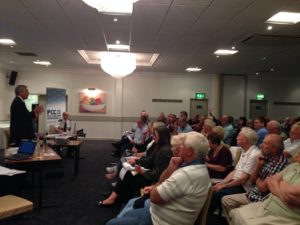A passionate public meeting in Harlow
At least 80 members of the public attended a lively and passionate meeting in Harlow to discuss policing and community safety issues.
The event, on the evening of Wednesday September 17, was one of many held across the county by Nick Alston to give people the chance to hear about crime trends in their area, and question the Police and Crime Commissioner, local Essex Police officers and the Community Safety Partnership.
Acting District Commander Chief Inspector Greg Wood praised some good work by local officers including a 27 per cent reduction in robbery (35 fewer offences), and a 17 per cent reduction in house burglary (82 fewer offences) as part of the forcewide predictive policing operation. DCI Paul Maleary was delighted that strong investigative work had brought some prolific local burglars to justice, but added that his detectives always welcomed and needed the help and support of the public in catching criminals and preventing crime.
Full details of crime trends in Harlow can be seen here.
Chief Inspector Wood also explained the implications of the force’s new local policing plans for Harlow, and the value of having officers returned to the direct supervision of local Inspectors and the District Commander. The Neighbourhood Policing Team for Harlow consists of one Inspector, three Sergeants and six Police Constables. In addition, there is a 24/7 Local Policing Team operating from Harlow police station with each shift consisting of two Sergeants and approximately fourteen Police Constables. These teams are supported by CID, PCSOs, Special Constables and other policing resources from across the county such as the Casualty Reduction Unit and specialist Major Investigation Teams.
There was a question from the audience about a highly regarded PCSO, with excellent relations with the local community, having recently retired without being replaced. There was a fear that the two-way flow of information between police and local people would be lost.
Nick Alston emphasised the need for regular, meaningful, contact between local communities and Essex Police. PCSOs were a vital part of this, and he welcomed the plans for weekly “street beat” surgeries in locations such as supermarkets, libraries and shopping centres. The PCC added that anyone needing to report crime or anti-social behaviour urgently should ring 101 or 999 immediately, rather than waiting for the next community meeting.
The major topic of discussion was Traveller encampments in the Harlow area. Assistant Chief Constable Julia Wortley, Harlow Community Safety Team Manager Marysia Rudgley, Essex Countywide Traveller Unit Manager Stephen Andrews and Robert Halfon MP joined the debate, along with two members of the travelling community.
Since October 2013, there have been 51 unlawful encampments in the Harlow area. Trespass on private land is a civil matter. Under Section 61 of the Criminal Justice and Public Order, providing the land owner has requested an encampment to move, the police can direct people to leave the site at short notice without reference to the courts where any of the three following conditions have been met,
• the unauthorised campers have caused damage to the land or property on the land;
• they have used threatening, abusive or insulting words or behaviour to the occupier, a member of his family or his employee or agent;
• there are six or more vehicles on the land.
Since October 2013, Essex Police has successfully served ten Section 61 notices on unlawful Traveller encampments in the Harlow area.
Section 62 powers are not available in Essex as there are no alternative sites available to direct Travellers to anywhere in the county.
MP Robert Halfon called for a “zero tolerance” policy, and asked the PCC to develop a strategy for Travellers. Marysia Rudgley advised that around one-third of Harlow consisted of open public space, and since October 2013, £26,758 had been spent on “preventative resources”, including creating infrastructure to prevent access for vehicles to land. In addition, £16,678 had been spent on cleaning up land after an unlawful encampment had been moved on. Steve Andrews stated that, partly as a result of changes to the legislation about local authority provision of Traveller sites, the only new permanent local authority site created in the county in the last 20 years was in Colchester district. In spite of local opposition there at the time, there was now a good relationship between the Travellers and the settled community. A recent Essex County Council report identified that there is a chronic under-provision of Traveller sites in the county as a whole, with the prospect of need increasing in coming years.
ACC Julia Wortley said it is the role of the police to tackle and investigate crime, wherever it occurs. But any allegation of crime must be linked evidentially to a particular person if it is to be progressed legally. It is unlawful and unethical to prosecute a group of people for criminal behaviour based on stereotypes or general supposition. She added that Essex Police has demonstrated many times its willingness to utilise Section 61 when appropriate. However, she added that Section 61 was a ‘blunt tool’ which had the primary effect of just moving travellers from one unlawful encampment to another, sometimes only a few hundred yards down the road. She stressed that Essex Police will investigate any allegations of crime and will take strong action within the existing law where there is sufficient evidence to establish that a crime has been committed by an individual.
An extremely passionate debate continued for over an hour. It was clear that no-one found the existing situation in Harlow to be acceptable.
Nick Alston thanked everyone for their contributions. He would now seek to take the following actions:
1) encourage lawmakers through Parliament to develop a more appropriate and meaningful legislative framework to govern unlawful encampments;
2) explore whether the full provisions of the Highways Act with regard to parking on the road side are being enforced;
3) establish whether existing Traveller sites, such as Fern Hill in Harlow, are fully utilised, and if they are not, how this situation can be rectified;
4) speak with council Chief Executives with regard to the appropriate and balanced provision of permanent Traveller sites across Essex, and the consequences flowing from the lack of a single transit site in our county;
5) establish better and more direct dialogue with the Travelling community;
6) fly-tipping, littering and other actions which deface our towns and countryside are unacceptable, and the appropriate authorities should continue to prosecute those responsible where the evidence allows.











